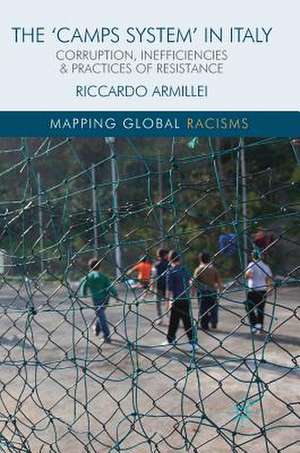The ‘Camps System’ in Italy: Corruption, Inefficiencies and Practices of Resistance: Mapping Global Racisms
Autor Riccardo Armilleien Limba Engleză Hardback – 31 mai 2018
This book deals with the social exclusion of Romanies (‘Gypsies’) in Italy. Based on interviews with Romani individuals, institutional and Civil Society Organisations’ (CSOs) representatives, participant observation and a broad range of secondary sources, the volume focuses on the conditions of those living in Rome’s urban slums and on the recent implementation of the so-called ‘Emergenza Nomadi’ (Nomad Emergency). The enactment of this extraordinary measure concealed the existence of a long-established institutional tradition of racism and control directed at Romanies. It was not the result of a sudden, unexpected situation which required an immediate action, as the declaration of an ‘emergency’ might imply, but rather of a precise government strategy. By providing an investigation into the interactions between Romanies, local institutions and CSOs, this book will deliver a new perspective on the Romani issue by arguing that the ‘camp’ is not only a tool for institutional control and segregation, but also for ‘resistance’, as well as a huge business in which everyone plays their part.
| Toate formatele și edițiile | Preț | Express |
|---|---|---|
| Paperback (1) | 581.14 lei 6-8 săpt. | |
| Springer International Publishing – 25 dec 2018 | 581.14 lei 6-8 săpt. | |
| Hardback (1) | 586.55 lei 6-8 săpt. | |
| Springer International Publishing – 31 mai 2018 | 586.55 lei 6-8 săpt. |
Preț: 586.55 lei
Preț vechi: 690.06 lei
-15% Nou
Puncte Express: 880
Preț estimativ în valută:
112.24€ • 117.48$ • 93.42£
112.24€ • 117.48$ • 93.42£
Carte tipărită la comandă
Livrare economică 31 martie-14 aprilie
Preluare comenzi: 021 569.72.76
Specificații
ISBN-13: 9783319763170
ISBN-10: 3319763172
Pagini: 226
Ilustrații: XIV, 268 p.
Dimensiuni: 148 x 210 x 18 mm
Greutate: 0.49 kg
Ediția:1st ed. 2018
Editura: Springer International Publishing
Colecția Palgrave Macmillan
Seria Mapping Global Racisms
Locul publicării:Cham, Switzerland
ISBN-10: 3319763172
Pagini: 226
Ilustrații: XIV, 268 p.
Dimensiuni: 148 x 210 x 18 mm
Greutate: 0.49 kg
Ediția:1st ed. 2018
Editura: Springer International Publishing
Colecția Palgrave Macmillan
Seria Mapping Global Racisms
Locul publicării:Cham, Switzerland
Cuprins
1. Inside 'campi nomadi': The Italian Approach to the Global Shanty Town Development. - 2. The Institutional and Spatial Segregation of Romanies in Italy.- 3. The Paradoxes of the Italian Approach Towards the Romani People.- 4. The Business of the Camps During the 'Nomad Emergency'.- 5. Between Self-Determination and 'Collective-Identity Closure'.- 6. Conclusions.
Notă biografică
Riccardo Armillei is Visiting Fellow at Deakin University Melbourne. Until December 2015 Dr Armillei worked for the UNESCO Chair team and the Alfred Deakin Institute for Citizenship and Globalisation (ADI) as an Associate Research Fellow. He holds a PhD in Social Sciences and has worked in the areas of Romani studies, forced migrations, social justice, education, cross-cultural theories and practices.
Textul de pe ultima copertă
This book deals with the social exclusion of Romanies (‘Gypsies’) in Italy. Based on interviews with Romani individuals, institutional and Civil Society Organisations’ (CSOs) representatives, participant observation and a broad range of secondary sources, the volume focuses on the conditions of those living in Rome’s urban slums and on the recent implementation of the so-called ‘Emergenza Nomadi’ (Nomad Emergency). The enactment of this extraordinary measure concealed the existence of a long-established institutional tradition of racism and control directed at Romanies. It was not the result of a sudden, unexpected situation which required an immediate action, as the declaration of an ‘emergency’ might imply, but rather of a precise government strategy. By providing an investigation into the interactions between Romanies, local institutions and CSOs, this book will deliver a new perspective on the Romani issue by arguing that the ‘camp’ is not only a tool for institutional control and segregation, but also for ‘resistance’, as well as a huge business in which everyone plays their part.
Caracteristici
Gives a voice to one of the most marginalized populations in Europe, the Romani people. Avoids emphasis on the superior power of the State and its sub-contracted CSOs, providing a more nuanced analysis of the power dynamics Observes and analyses the existence of a democratic deficit in the way these actors operate and co-operate with each other















